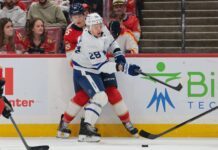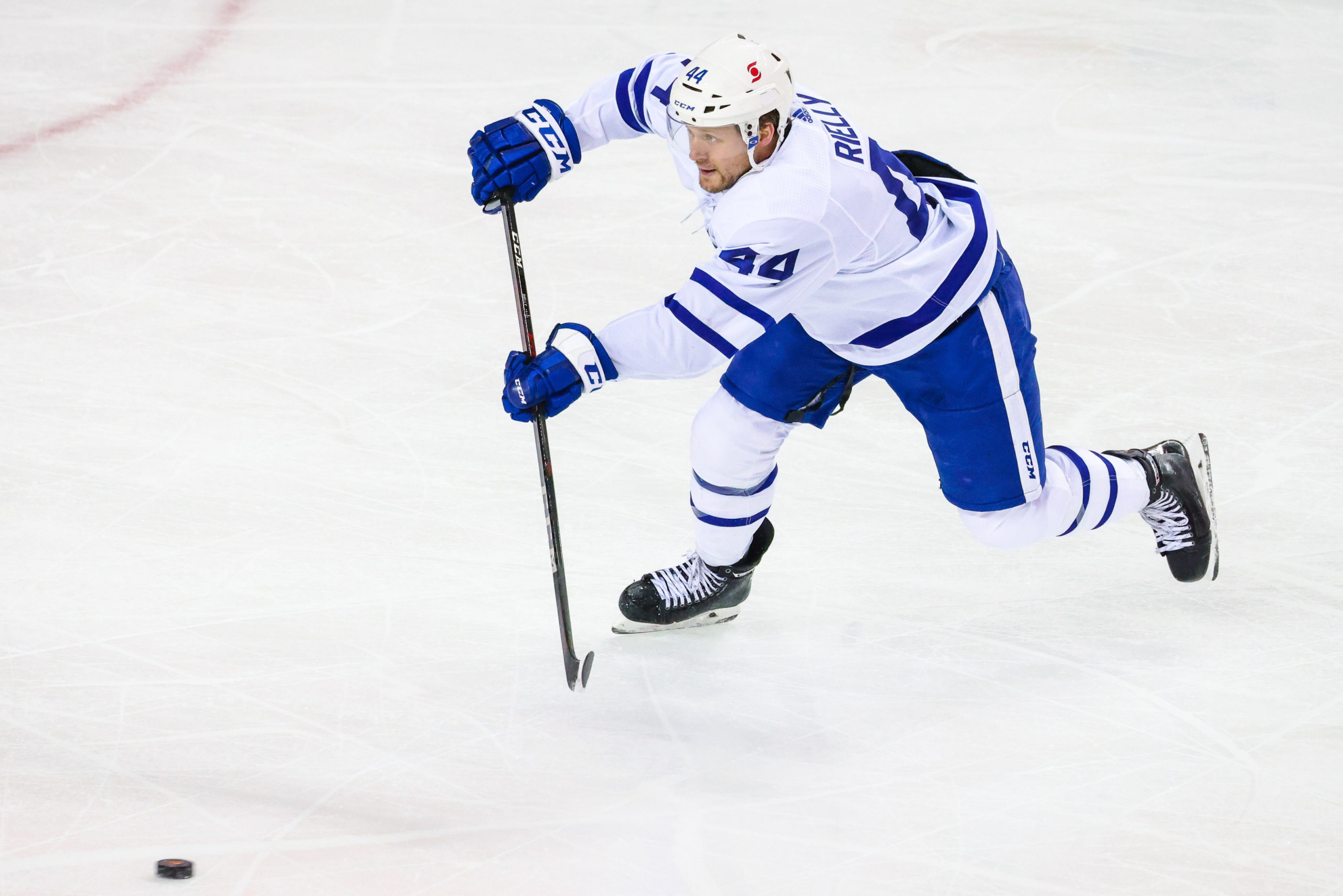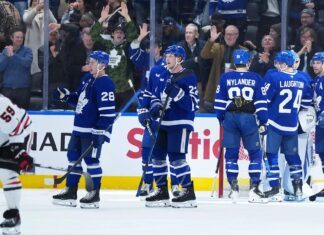After a long three days, the verdict is in from the DoPS: Five games for Morgan Rielly.
Here is the DoPS’ logic for the ruling:
Saturday night in Ottawa, Leafs defenseman Morgan Rielly was assessed a major penalty and a game misconduct for forcefully cross-checking Senators forward Ridly Greig in the head well after the end of the play.
As the video shows, with seconds left in the game and the Senators ahead, Greig is sprung on a breakaway with the Maple Leafs having pulled their goaltender and Rielly following on the backcheck. Greig approaches the goal and takes a slapshot into the empty net, then turns up ice to celebrate the goal. As he does so, Rielly skates toward Greig with purpose and for some distance, raises his stick high with both hands, and intentionally strikes Greig in the head with substantial force. This is cross-checking.
It is important to note that there are a number of factors that separate this play from other cross-checking violations, elevating the incident to merit this level of supplemental discipline.
This is not the case of two players mutually jousting where both players could reasonably expect escalating contact or for both players’ sticks to come up high.
This is also not an inadvertent or accidental use of the stick while leveraging for body position or other hockey purposes.
This play occurs well after the goal has been scored, late in the game with the score out of reach, and with the sole purpose of retribution.
While we acknowledge Rielly’s argument that his stick does make some contact with Greig’s body before striking Greig in the head, this is not a case where a stick that is raised to an excusable level is significantly deflected up and into the head and neck area.
Rielly pursues Greig for some time and has sufficient opportunity to choose to engage him in a different manner or ensure that this cross-check is delivered solely to the body. Instead, fully in control of this play at all times, Rielly chooses to raise his stick to the level of Greig’s head and neck, approaching from the side and delivering a forceful strike to the face with his stick well after the goal has been scored.
In short, this is not a hockey play. This is an intentional, forceful strike to an opponent’s head using the stick as a weapon to exact retribution on an opponent well after a goal has been scored.
To summarize:
– This is cross-checking.
– Rielly has neither been fined nor suspended previously in his 769-game NHL career.
– The Department of Player Safety has suspended Morgan Rielly for five games.
Elliotte Friedman researched cross-checking incidents leading to supplemental discipline over the past eight years and discovered the following:
I found 61 cases of supplemental discipline involving crosschecks. Only 18 ended with suspensions; 43 were fines. Some that resulted in fines were pretty nasty, so you can expect Toronto to make comparisons with what Rielly did. Since Saturday, there were examples of crosschecks that got zero punishment shared on social media, and the Maple Leafs probably saw those, too.
The lengthier ones (four-to-six games) involved three repeat offenders — Nazem Kadri (twice), Gabriel Landeskog and Evgeni Malkin — plus a serious injury (Robert Bortuzzo to Viktor Arvidsson).
And Perron (six games).
Colour us shocked the Leafs have been caught up in a new precedent that probably won’t be consistently enforced going forward.
There is the option to appeal the suspension (within 48 hours) to Gary Bettman, although David Perron did the same in December and Bettman upheld the six-game suspension. Unlike Perron, Rielly wouldn’t be eligible to appeal to an independent arbitrator if Bettman were to uphold this ruling (the suspension needs to be six or more games). An appeal to the commissioner worked to reduce Jason Spezza’s suspension from six to four games a few years ago, but historically, the process takes long enough that the majority of the suspension is usually already served.
Last season, the Leafs rallied around Rielly’s absence in spectacular fashion, going on an 11-2-2 run that more or less secured their divisional playoff spot by the end of December.
Before his knee injury in November 2022, Rielly was playing 23 minutes per game through the opening 20 games, producing 16 assists and zero goals in that time. The Leafs were also without TJ Brodie for the first seven games of Rielly’s 15-game absence, so they forged ahead with a top pairing of Mark Giordano – Justin Holl, a second pairing of Rasmus Sandin – Timothy Liljegren, and a bottom pairing of some combination of Jordie Benn, Victor Mete, and Mac Hollowell. When Brodie returned, he formed a pairing with the recently acquired Conor Timmins, and the team continued to run a top four of Giordano-Holl and Sandin-Liljegren until Rielly was back.
Rielly is playing an even bigger role on the blue line this season — 24:21 in TOI per game places him 17th in the NHL among defensemen — and he has been more productive with seven goals and 43 points in 50 games. Holl and Sandin have departed for pastures anew and Brodie has taken a step(s) back in his play, while Timmins is out indefinitely with mononucleosis. This year, the Leafs will forge ahead with one stable pairing (Simon Benoit – Jake McCabe) and throw together Brodie (now on the left) – Liljegren and Lagesson – Giordano as their other pairings to start.
While Rielly’s absence will be shorter, the stakes are higher this time around. The Leafs are now a few weeks out from the trade deadline with the inside track on the third spot in the division, but they must win their games in hand to overtake Tampa and keep the chasing pack in the wildcard race off their heels. They are facing a stretch of schedule — Blues x2, Flyers, Ducks, and Coyotes — where they need bank points before taking on a much tougher slate of opponents starting on February 22 (Vegas x2, the Avalanche, the Rangers, and the Bruins over a six-game stretch).
Add it all up, and it’s time for the Leafs’ mostly healthy forward group — particularly their core leadership group — to lead the way by digging in. The Leafs played their most committed form of team defense of 2022-23 when they battled injuries on the blue line last November – December, and the recipe needs to be the same this time with the stakes even higher.
The other notable aspect during the team’s 11-2-2 run without Rielly last year was the performance of their goaltenders. Matt Murray went 6-1-1 with a .931 save percentage, and Ilya Samsonov 5-1-0 with a .920. Samsonov’s first half this season wasn’t nearly as strong as last season’s, but this is certainly the time to step up, starting tonight vs. St. Louis.









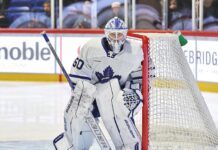


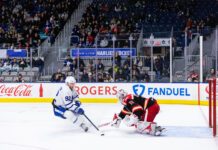
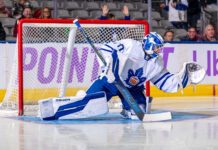

![John Gruden after the Leafs prospects’ 4-1 win over Montreal: “[Vyacheslav Peksa] looked really comfortable in the net… We wouldn’t have won without him” John Gruden, head coach of the Toronto Marlies](https://mapleleafshotstove.com/wp-content/uploads/2025/09/gruden-post-game-sep-14-218x150.jpg)




